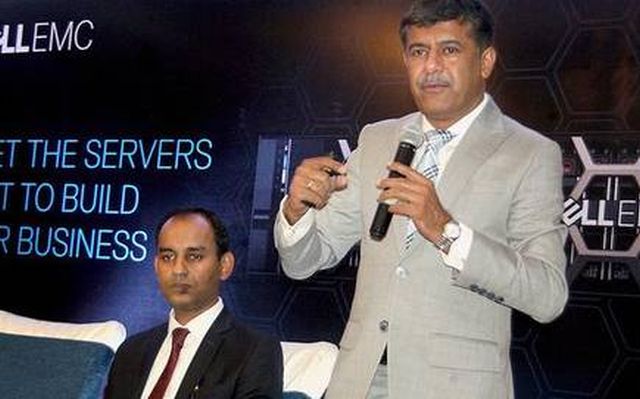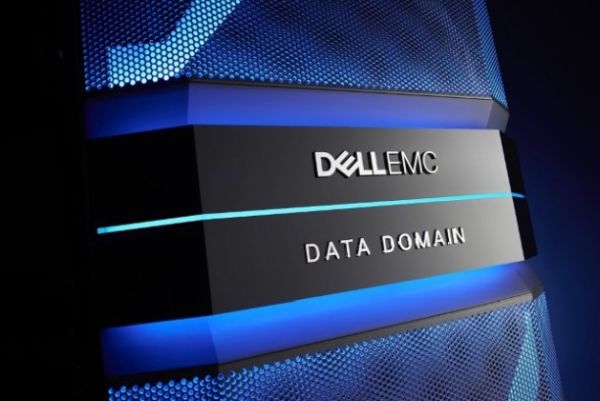
by admin | May 25, 2021 | Branding, Business, Corporate, Corporate Buzz, Large Enterprise, Markets, SMEs, Technology

Rajesh Janey
By Nishant Arora,
New Delhi : Cloud adoption is undoubtedly growing very fast in India — but the running costs, coupled with the desire to have data on premises with a Cloud-like feel, is also driving Indian enterprises towards owning a multi-Cloud experience, says Rajesh Janey, President and Managing Director, India Enterprise, Dell EMC.
The digital transformation journey that began with data storage for large Indian organisations has now resulted in a realisation that massive data-sets are not only critical from the storage perspective but also from the perspective of how to harness those and derive maximum growth.
“Cloud has shown a significant growth but when we look at the India scene, traditional IT infrastructure is still very big when compared to the overall Cloud spend.
“CEOs and CTOs who wanted ease, simplicity, agility and operational availability with Cloud are also looking at the same experience on premises. This is true mostly for those organisations with sustained, predictable workloads,” Janey told IANS.
“The enterprises are aiming for a Hybrid Cloud model — even better a multi-Cloud offering — where the same ease, simplicity, manageability, auto-provisioning and orchestration can be achieved right in their backyards that is associated with Cloud,” explained Janey, a long-time industry veteran.
At a time when data becomes the key and unlike video streaming or retail shopping where Cloud becomes necessary to make sense of the “bursty, unpredictable” data, organisations in India with sustained workloads are looking at vendors, asking hey, can I take my data where I sit?
“The new thought process among Indian CEOs and CTOs is: Can I bring data on-premise? Here, I see three clear trends for 2019: Data explosion, automation and a demand for Cloud-like infrastructure on-premise. Remember that Cloud is not a destination but a way of doing things in a certain way,” Janey told IANS.
In India, Dell EMC works with Chitale Dairy which is using an Internet of Thing (IoT) solution to help keep livestock healthy, and producing 10 times higher yield through big data analytics, automated farmer to-do lists and computerised breeding management.
Dell EMC “VxRail” (a hyper-converged appliance family) has successfully driven business growth for Truetzschler India Private Limited, a leading manufacturer and supplier of textile, carding and comber machinery.
Pune-based KPIT Technologies developed its IT infrastructure with Dell-EMC, which has, over time, helped them foster innovation and gain better control over their technology support system.
“What I witnessed in the later part of this year was that Indian enterprises now accept data is the key. Storing, managing, protecting and optimising data are now important conversations. In the past year or so, we have seen an era of leveraging data, deriving actionable and business intelligence (BI),” noted Janey.
Globally, in its third quarter for fiscal 2019, Dell Technologies reported revenues of $22.5 billion, up 15 per cent from the prior period.
Infrastructure Solutions Group revenue for the third quarter was $8.9 billion — a 19 per cent increase. This was driven by revenue of $3.9 billion in storage and $5.1 billion in servers and networking.
For Jeff Clarke, Vice Chairman, Products and Operations, Dell Technologies, data is becoming the most valuable and differentiating asset for many organisations as it opens up new revenue streams and unearths opportunities for improvement in almost every part within the organisation.
According to Janey, embedded in the data are disruptive technologies that are happening across the spectrum.
“Analysing data (via automation, Artificial Intelligence and Machine Learning), managing large storage and unpredictable growth — everything has come to the fore.
“Have we reached an age of actionable, data-based intelligence? In some way yes, especially in the consumer space — but a lot is yet to come,” said Janey.
“Clearly, storing and managing humongous data, protecting against its loss and misuse from cyber threats and optimising it for growth will drive innovation in Indian enterprises next year,” Janey emphasised.
(Nishant Arora can be contacted at nishant.a@ians.in)
—IANS

by admin | May 25, 2021 | C S R, Corporate, Markets, News, Online Marketing, Technology
 By Bhavana Akella,
By Bhavana Akella,
Bengaluru : Riding on the fourth industrial revolution with disruptive technologies, global computer data storage major Dell EMC is building IT infrastructure for citizen services like Aadhaar in “Digital India”.
“As a leading hardware vendor, we build IT infrastructure also for the government to provide citizen services like Aadhaar, passports, invoices of customs and GST settlements,” Dell EMC India Managing Director Rajesh Janey told IANS here.
Though US-based Dell Technologies has been hard-selling its computers, laptops, tablets and servers in India over the years, it began providing data storage, hybrid Cloud and data protection solutions to enterprises and state-run organisations following its acquisition of EMC in 2016 for a whopping $67-billion (Rs 4.61 lakh crore).
In September 2016, Dell Technologies acquired Massachusetts-based data-storage systems major EMC Corp, founded in 1979 and named after its founders Richard Egan, Roger Marino and John Curly, in one of the largest deals in the technology sector, worldwide.
“Data on the unique identification card (Aadhaar) issued to citizens is run and stored on our server racks managed by third-party vendors,” Janey said in an exclusive interview.
Similarly, passports are archived on the company’s storage while Customs and Excise departments use Dell IT infrastructure to raise invoices for businesses.
The company sells IT infrastructure products and services, including flash-based storage, data protection, security, hyper-converged infrastructure, backup solutions for small and medium businesses.
“The central and state governments also use our digital platforms for the Goods and Services Tax (GST) settlements by traders on the GST Network across the country, Janey asserted.
In the enterprise segment, leading banks and telecos use Dell EMC’s hardware for computing, storage and data security.
“Our products and solutions enable enterprises to undergo digital transformation as part of the fourth industrial revolution, leaving behind legacies such as mainframes, client servers and networked work stations,” Janey said.
The first industrial revolution occurred in the 18th century when agrarian practices and rural life under went industrial change with the roll out of the steam engine; the second from 1870 to 1914 marked mass production in industries and the third, from the 1980s, and subseqeuntly witnessed the emergence of personal computers and internet.
In the fourth revolution, disruptive technologies have been replacing the conventional platforms with artificial intelligence (AI), internet of things (IoT), Cloud, robotics and automation.
Hinting that new technologies would disrupt the functioning of many businesses, Janey said the increasing use of AI would make humans digital conductors, telling machines what they have to do.
“More mundane and routine tasks will get offloaded to machines,” he noted.
According to industry estimates, the number of IoT devices — devices, home appliances and vehicles connected through the internet — will explode to 200 billion over the next decade from 20 billion in 2020.
“Dropping cost of networking is fuelling the growth of IoT devices. At the same time, when we have so many devices with data, we need AI to analyse and convert it into actionable intelligence, thereby removing the routine tasks,” the top executive noted.
The evolution of sectors will happen as these technologies are being introduced into them, said Janey, who was earlier EMC’s President for India and the South Asia region.
“The future requires rethinking of what an intelligent human being can do. Our belief is the skilling of workforce will change. People will move away from mundane tasks to higher level skills. Secretarial work will be passe,” he pointed out.
With around 1.3 billion people and growing, India is a huge market for any industry, Janey admitted.
“Skilling our people through initiatives like the government’s Skill India and courses by educational institutions on Big Data are key, as sectors are undergoing digital transformation,” he added.
With India among the top five markets in the world for Dell EMC’s services, after America, China, Europe and Britain, the company is planning to hire more techies in India, Janey said, but did not specify the present workforce present and how many are being hired in the subcontinent.
Dell EMC claims to be the leader in India’s storage market with 43 per cent share by revenue and second-largest in server market with 26 per cent share by revenue.
The company is also said to have leadership in flash-storage and hyper-converged infrastructure segments.
“We are investing $4.5 billion on research and development in fiscal 2018-19. India contributes significantly to the research, particularly in servers,” Janey stated.
“India is ahead of other developing nations in the use of digital infrastructure,” he disclosed.
The country is also at par with the developed nations in innovation as advancements in e-commerce industry like cash-on-delivery and video subscriptions allowing download options by streaming sites are Indian innovations for the world, driven by consumer needs, the official said.
With its diverse offerings through hardware, software and data storage areas, the company is upbeat about its market share increasing in India as businesses head for disruption.
(Bhavana Akella can be contacted at bhavana.a@ians.in )
—IANS


